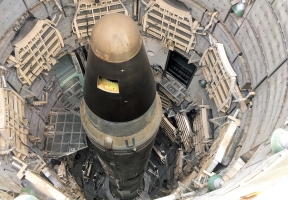By Daniel Nardini
 In 1994, Russia, the United States and the United Kingdom signed what is now known as the Budapest (Hungary) Memorandum where the sovereignty of Ukraine’s territory would be guaranteed by the three signatories of this memorandum in exchange for Ukraine giving up its nuclear weapons. We saw how that worked out. Russia did not keep its word to put it mildly, and Ukraine is now fighting for its life against Russian aggression since 2014. The United States and the United Kingdom did not come to the aid of Ukraine, and they only put in limited sanctions against Russia. If Ukraine had not given up its nuclear weapons, would Russia still have invaded Ukraine? This is the question Ukrainians have been asking themselves since 2014. More to the point, both the United States and the United Kingdom failed to be the guarantors for Ukraine’s sovereignty.
In 1994, Russia, the United States and the United Kingdom signed what is now known as the Budapest (Hungary) Memorandum where the sovereignty of Ukraine’s territory would be guaranteed by the three signatories of this memorandum in exchange for Ukraine giving up its nuclear weapons. We saw how that worked out. Russia did not keep its word to put it mildly, and Ukraine is now fighting for its life against Russian aggression since 2014. The United States and the United Kingdom did not come to the aid of Ukraine, and they only put in limited sanctions against Russia. If Ukraine had not given up its nuclear weapons, would Russia still have invaded Ukraine? This is the question Ukrainians have been asking themselves since 2014. More to the point, both the United States and the United Kingdom failed to be the guarantors for Ukraine’s sovereignty.
Which brings us forward to the world we live in today. If neither the United States nor the United Kingdom can guarantee the safety and sovereignty of any country from naked aggression, then what can they do? It is easy to blame current U.S. President Donald Trump for the mess that started decades before. Fact of the matter is that the United States was not a reliable guarantor then, and it is definitely not a reliable guarantor now. Smaller nations are now at the mercy of those bigger nations like Russia and China who wish to create or recreate empires from long ago. Under these circumstances, what do smaller, less powerful nations do? They may increase the size and budgets for their military, but this may not be enough of a deterrence against a much larger military power. They may make alliances with other smaller countries to protect themselves, but even this may not work because the smaller countries combined may still not have enough military might. The combined military strength of the European Union may be more than enough to deter Russian aggression, but that is an exception to the rule.
In the case of East Asia and Southeast Asia, China has a military ten times the size of the Russian military and the countries of Asia and the Pacific rim stand little to no chance against the forces of the Chinese People’s Liberation Army Navy. Taiwan is the most vulnerable. No matter how well armed Taiwan may be, its forces simply do not have the size and scale to fight China. The one thing protecting it is the body of water between Taiwan and China. This body of water, along with the U.S. Navy, had been protecting Taiwan for decades. But how long will the United States be there to protect Taiwan? In my view, it is absolutely necessary for the United States to protect Taiwan because if Taiwan falls then China could just as easily attack the U.S. territories of Guam, the Northern Mariana Islands and maybe even American Samoa. Personally, I have no confidence that the current U.S. administration will defend Taiwan.
Which brings up the next, and most terrible thought. What if Taiwan created and possessed nuclear weapons? I am sure that this thought is very much crossing the minds of all government officials in Taiwan now. With a limited military, and no real guarantee of outside intervention, this seems like the best option for a guarantee that China may not invade Taiwan. Yes, it would be horrible if Taiwan launched nuclear missiles against the cities where Chinese troops may be concentrated to invade Taiwan, but by then Taiwan will be desperate and facing complete destruction from China. When a country is facing the option of conquest and probably total extinction, then what else is there to do?
Personally, I have advocated that Taiwan, South Korea and even Japan possess nuclear weapons. There is no real guarantee anymore of U.S. military protection, and in this case a dangerously armed and belligerent China has to be countered some way. If the United States fails to fulfill its treaty obligations to Japan, South Korea and Taiwan, then these countries having nuclear weapons may just make the Chinese government think twice about starting a war with their neighbors. Yes, it will become a far more dangerous world than we are in now, but the international order is breaking down, and mutually assured destruction may be the best option to keep the peace when all other means fail.
 Remote Chicago Small Biz Expo Returns February 19, 2026
Remote Chicago Small Biz Expo Returns February 19, 2026

 February, is one Click College Admit Month February 19, 2026
February, is one Click College Admit Month February 19, 2026






The Ever Dangerous Nuclear Ace Card
By Daniel Nardini
Which brings us forward to the world we live in today. If neither the United States nor the United Kingdom can guarantee the safety and sovereignty of any country from naked aggression, then what can they do? It is easy to blame current U.S. President Donald Trump for the mess that started decades before. Fact of the matter is that the United States was not a reliable guarantor then, and it is definitely not a reliable guarantor now. Smaller nations are now at the mercy of those bigger nations like Russia and China who wish to create or recreate empires from long ago. Under these circumstances, what do smaller, less powerful nations do? They may increase the size and budgets for their military, but this may not be enough of a deterrence against a much larger military power. They may make alliances with other smaller countries to protect themselves, but even this may not work because the smaller countries combined may still not have enough military might. The combined military strength of the European Union may be more than enough to deter Russian aggression, but that is an exception to the rule.
In the case of East Asia and Southeast Asia, China has a military ten times the size of the Russian military and the countries of Asia and the Pacific rim stand little to no chance against the forces of the Chinese People’s Liberation Army Navy. Taiwan is the most vulnerable. No matter how well armed Taiwan may be, its forces simply do not have the size and scale to fight China. The one thing protecting it is the body of water between Taiwan and China. This body of water, along with the U.S. Navy, had been protecting Taiwan for decades. But how long will the United States be there to protect Taiwan? In my view, it is absolutely necessary for the United States to protect Taiwan because if Taiwan falls then China could just as easily attack the U.S. territories of Guam, the Northern Mariana Islands and maybe even American Samoa. Personally, I have no confidence that the current U.S. administration will defend Taiwan.
Which brings up the next, and most terrible thought. What if Taiwan created and possessed nuclear weapons? I am sure that this thought is very much crossing the minds of all government officials in Taiwan now. With a limited military, and no real guarantee of outside intervention, this seems like the best option for a guarantee that China may not invade Taiwan. Yes, it would be horrible if Taiwan launched nuclear missiles against the cities where Chinese troops may be concentrated to invade Taiwan, but by then Taiwan will be desperate and facing complete destruction from China. When a country is facing the option of conquest and probably total extinction, then what else is there to do?
Personally, I have advocated that Taiwan, South Korea and even Japan possess nuclear weapons. There is no real guarantee anymore of U.S. military protection, and in this case a dangerously armed and belligerent China has to be countered some way. If the United States fails to fulfill its treaty obligations to Japan, South Korea and Taiwan, then these countries having nuclear weapons may just make the Chinese government think twice about starting a war with their neighbors. Yes, it will become a far more dangerous world than we are in now, but the international order is breaking down, and mutually assured destruction may be the best option to keep the peace when all other means fail.